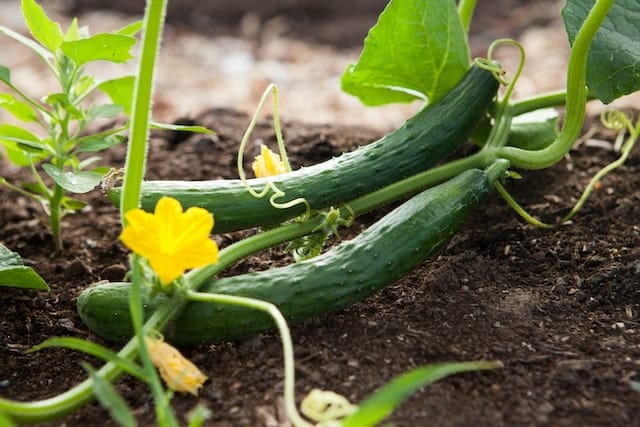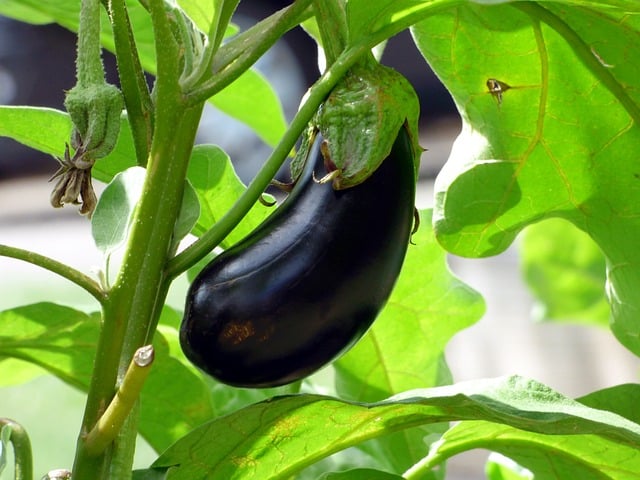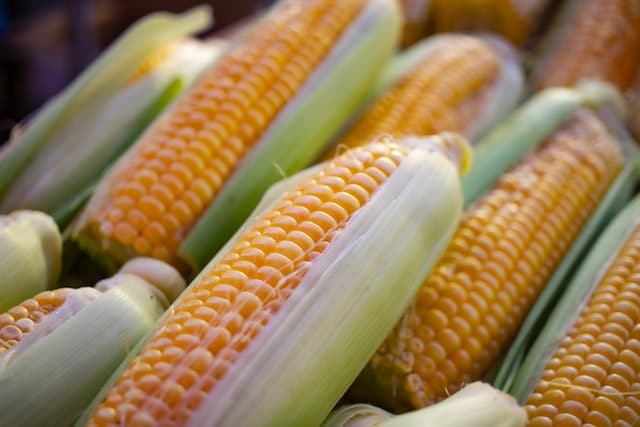Introduction – Carbon Reduction and Home Produce
The rationale for growing your own produce is to reduce carbon emissions from food transportation which accounts for over 10% of total food emissions. Summer is the height of the growing season. The days are long, and the sun is shining. The weather is warm, and the plants are growing. This is the time of year when the fruits and vegetables are ripe and ready to eat. There are vegetables to plant in summer and vegetables to harvest in summer. Summer is the time to enjoy the outdoors and the time to enjoy the fruits of your labor.

10 Vegetables To Plant In Summer
Flourishing your vegetable garden in summer includes picking the right plants. Here are 10 vegetables that love the summer heat:
1. Cucumbers
Cucumbers are one of the best vegetables to grow in the summer months. This vegetable thrives in warm and sunny conditions, making it an ideal choice for gardeners with long, hot summers. What’s more, cucumbers are very easy to care for, and they require very little maintenance. They do not need frequent watering or fertilization and can easily be grown from seed or transplanted from a starter plant. Additionally, cucumbers are incredibly productive, with just a few plants producing a steady supply of juicy fruits all summer. With their straightforward growing requirements and bountiful yields, these tasty veggies are the perfect choice for any home gardener.
2. Tomatoes
Tomatoes are one of the best vegetables to grow in summer, thanks to their relatively short growing season and low maintenance requirements. Whether planted from seedlings or seeds, tomatoes need lots of sunlight and well-drained soil to thrive. In addition, regular watering and the occasional application of fertilizer are highly recommended for optimal growth. Given those conditions, it is no surprise that tomatoes grow quickly during the hot summer months. Their bright red fruits add a vibrant pop of color to any garden, making them an ideal choice for both large and small vegetable gardens.
3. Peppers
Peppers are another excellent choice for summer gardens. Like tomatoes, they need lots of sunlight and well-drained soil to thrive. They also require regular watering and the occasional application of fertilizer. Peppers come in various colors, shapes, and sizes, making them a versatile addition to any garden. From small and sweet bell peppers to fiery hot chili peppers, there is a pepper variety to suit every taste. Moreover, peppers are generally very easy to care for, making them an ideal choice for novice gardeners.
4. Squash
Squash is an incredibly versatile vegetable that is perfect for growing in summer. They are easy to cultivate and can be used in various recipes, from spicy curries to traditional stir-fries. And best of all, they thrive in warm weather and will continue producing bountiful harvests even as the days get shorter and the temperatures drop.
Whether planting them from seed or starting with seedlings, squash is a great vegetable for gardeners. You can turn your summer vegetable garden into a veritable squash paradise with proper care and attention! Mid-May is the earliest time to plant and for some of you August is pretty much the latest squash planting time. So what are you waiting for? Get out there and start growing some delicious summer squash today!
5. Eggplant
Eggplants are a great vegetable to plant in summer, as they thrive in warm weather and require little care. Unlike many other vegetable crops that require consistent watering or fertilization, eggplants are quite hardy and can usually be left to their own devices for most of the season. Additionally, eggplants grow well in a wide range of conditions, from sandy soil to loamy dirt, so you don’t need to worry about matching your soil type perfectly with the vegetable. This makes them an ideal crop for both beginning gardeners and experienced growers alike. So if you’re looking for a vegetable to kick off your summer gardening season with, look no further than eggplants – they’re truly one of the best!

6. Sorrels
Sorrels are one of the best vegetables to plant in the summer months. They are known for their ability to thrive in the heat, making them an ideal crop for hot weather. In addition, they require very little maintenance, requiring no fertilization or watering once they are established in the ground. With its deep green leaves and earthy flavor, sorrel is also a delicious vegetable that can be enjoyed fresh right out of the garden or cooked into a wide range of dishes. Whether you’re looking for a simple salad green or something more adventurous, sorrel is the perfect vegetable to plant in your summer garden.
7. Beans
Beans are one of the best vegetable crops to grow in summer. These hearty plants thrive in hot, sunny weather, and you can easily plant them right into the ground. Additionally, beans are nutrient-dense and low in calories, making them a healthy choice for anyone looking to incorporate more fresh produce into their diet. Another benefit of growing beans is that these vegetable plants have relatively shallow roots, making them easier to care for than other types of produce. And if you’re looking for an easy vegetable crop to tend, it doesn’t get much simpler than planting some beans! Whether you like to harvest your fresh beans or prefer to buy them from the store, this vegetable is sure to become a staple in your summer meals.

8. Sweet Potatoes
Sweet potatoes are one of the best vegetables to plant in summer because they thrive in warm temperatures and bright sunlight. With their deep, rich color and dense flesh, these hardy plants pack a nutritional punch that makes them especially appealing for gardeners looking to get the most out of their vegetable beds. Moreover, sweet potatoes grow extremely well in all types of soil, making them an excellent choice for new gardeners or those who don’t want to worry about specialized planting conditions.
9. Corns
Corn is one of the best vegetables to plant in summer, thanks to its ability to thrive under warm, sunny conditions. This hearty vegetable has an extensive root system that helps it tolerate periods of drought and heat, making it a top choice for hot summer months. Furthermore, corn is relatively easy to grow and requires relatively little maintenance. With proper care and regular watering, your corn plants will quickly take root and produce bountiful crops of fresh kernels. And if you’re keen on sustainable growing techniques, you’ll be happy to know that corn is also an ideal vegetable to plant using organic methods.
10. Greens
Summer is the perfect time to grow fresh greens in your garden. Unlike many other vegetable plants, greens have a relatively short growing season and can be grown abundantly throughout the hotter months of the year. Additionally, greens are packed with essential vitamins and nutrients, making them one of the healthiest vegetable options. Whether preparing a summer vegetable salad, adding fresh greens to your sandwiches, or simply snacking on them straight from the garden, there are plenty of delicious ways to enjoy this highly versatile vegetable. With proper care and maintenance, getting your summer garden ready for fresh greens will be incredibly rewarding and well worth the effort!
General Principles For Summer Vegetables
ShrinkThatFootprint provides a list of 10 vegetables to grow in summer. What if you have a question about a different one? We collected 7 principles to evaluate whether yours is suited for the summer. Take a look.
1. Choose the Right Plants: Some plants are well-suited to the summer heat, while others are not. Choose heat-tolerant plants that can thrive under the high temperatures and intense sunlight of summer. Examples include zinnias, sunflowers, tomatoes, peppers, and cucumbers.
2. Watering: In the summer, plants will generally need more water due to increased evaporation. Water your plants early in the morning or late in the evening to reduce evaporation and to ensure that the water reaches the roots. Be careful not to overwater, though, as this can lead to root rot and other problems.
3. Mulching: Mulch helps to retain soil moisture and prevent weed growth. It also helps to keep plant roots cooler by shielding them from the sun’s rays. Apply a layer of organic mulch (like straw, wood chips, or compost) around your plants, but be sure to leave some space around the plant stems to prevent rot.
4. Pruning: Summer is a good time for light pruning and deadheading (removing spent flowers) of many plants. This can encourage more blooms and promote healthier growth.
5. Pest and Disease Management: Summer can bring an increase in pests and diseases. Regularly check your plants for signs of infestation or disease, and deal with any issues promptly to prevent them from spreading. Consider using organic or environmentally friendly pest control methods where possible.
6. Sun Protection: Some plants might require protection from the intense midday sun to prevent scorching. This can be especially important for young plants and those that are not as heat-tolerant. Use shade cloth, plant umbrellas, or strategic placement of plants to provide some shade.
7. Nutrient Supply: With the increased growth in the summer, plants may need additional nutrients. Using a balanced fertilizer can help provide these nutrients, but be sure to follow the instructions on the label to avoid over-fertilizing.
Wrapping Up
In conclusion, these are some of the best vegetables to plant in summer. While each vegetable has its unique benefits, they are well-suited for hot, sunny weather and will provide you with an abundance of fresh produce to enjoy throughout the season. With proper care and attention, your summer garden will be bountiful and thriving in no time!
